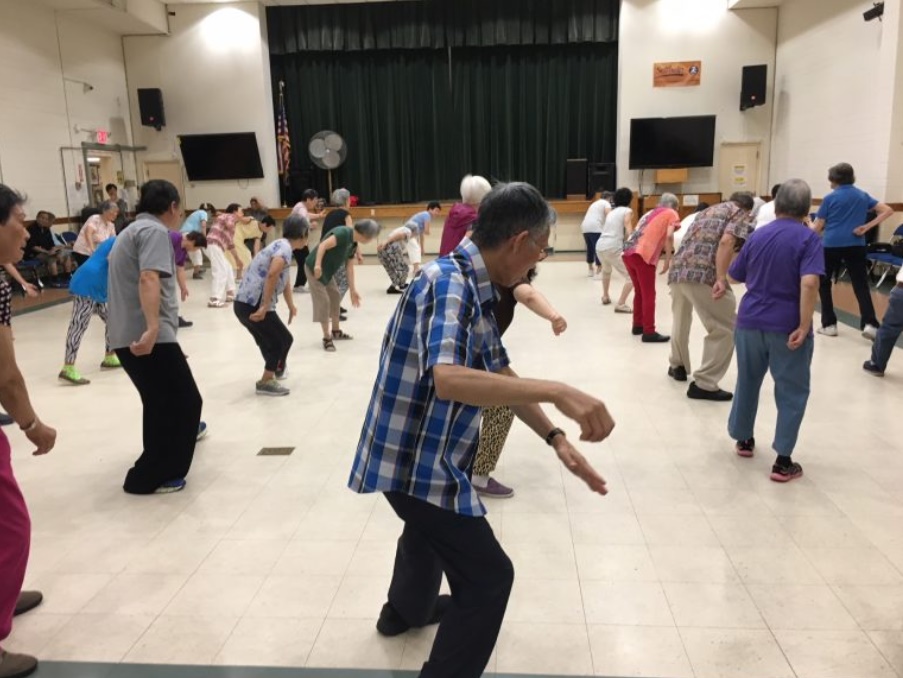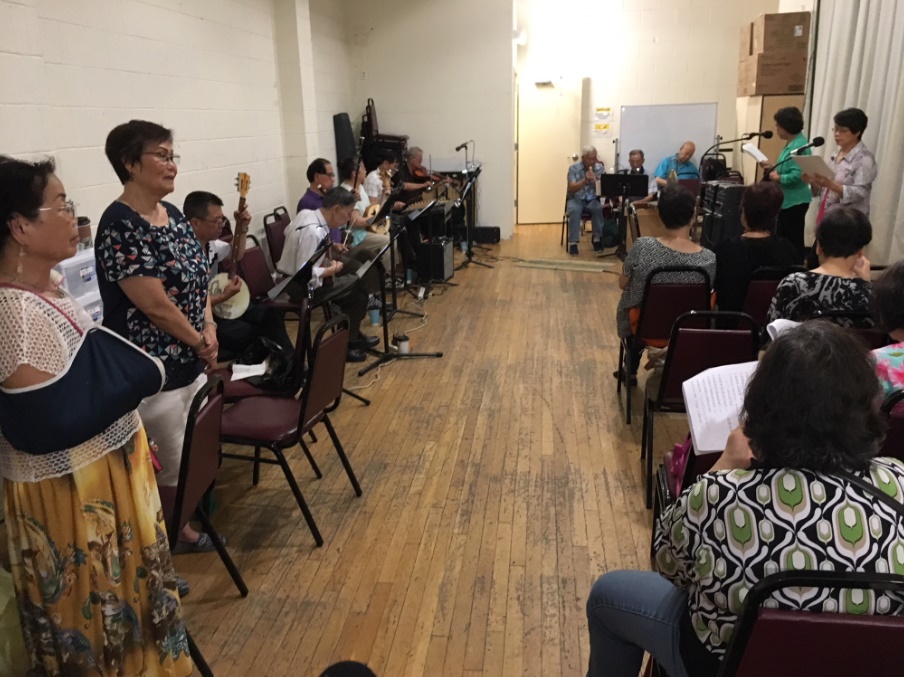by Liz Tung and Jad Sleiman. This article was originally published by WHYY.

Members at the Selfhelp Benjamin Rosenthal Senior Center in Queens, New York, perform tai chi on a Friday morning (Jad Sleiman)
It’s a Friday morning, and the Selfhelp Benjamin Rosenthal Senior Center in Flushing, Queens is bustling with activity.
In one room, around two-dozen Asian seniors are practicing tai chi. Nearby, another group rehearses an opera, their voices rising above the reedy twang of traditional Chinese instruments.
But Jane Qiu, the program director here, says Selfhelp’s seniors weren’t always so engaged.
“By observation, I can see some members, when they came here, were so sad and just crying,” Qiu says. “And now they are just involved in all activities, smiling. You can see their faces here, just fewer couch potatoes.”
Selfhelp is one of 25 senior centers in New York City’s Thrive NYC initiative, an $850 million effort to expand mental health access to a wide range of New Yorkers. The program could prove especially important in neighborhoods like Flushing, where Asian — and especially Chinese — immigrants make up a majority of the diverse population. That’s because, according to recent research, Asian seniors living in the United States may be more at risk for psychological distress than public health officials once thought — and less likely to seek help.
“We’ve been seeing a tremendous amount of depression, anxiety, sense of hopelessness, stress, as well as suicidal ideations,” says XinQi Dong, a geriatric physician and researcher, who heads the Rutgers Institute for Health, Health Care Policy and Aging Research. “The numbers are much higher than we anticipated.”
Dong is one of the lead researchers of one of the largest cohort studies in a Western country focused on the health and well being of ethnically Chinese seniors. He says it isn’t just psychological distress that plagues Chinese seniors in the United States — it’s a cultural stigma against mental health issues and treatment.
“There’s a great deal of shame and misbelief associated with having mental illnesses,” he says. “I think from a culture perspective that stigma and the sense of helplessness exacerbates those conditions.”
Family and mental health distress
Dong says researchers are still figuring out what causes the relatively high levels of mental distress among Chinese seniors, but they’ve identified a few.
He says acculturation issues related to immigration can affect mental and physical health, as can neighborhood conditions that affect safety, access to services, and community cohesion.
But Dong says one factor stands out: family.
“Family conflict, issues of emotional closeness, social interactions, elder abuse-related issues are strongly associated with mental health,” he says.
Especially important, Dong says, is the traditional Confucian principle called filial piety, which defines respect and care for older family members as an essential social value.
“There’s a Chinese proverb that says raising children is protection against old age and frailty,” he says. “And previous studies find that filial piety is positively associated with older adults’ physical as well as the psychological well-being.”
By contrast, a lack of filial piety — and the disappointed expectations that go along with it — is associated with worse health among Chinese seniors.
That can be a real problem in families with a cultural gap between immigrant parents and their American-raised children — especially in a city like New York, where quarters tend to be cramped, and financial pressures high.
Jane Qiu, who directs the Selfhelp senior center in Queens, says it’s a dynamic she’s seen over and over.
“Because of the housing situation, when the children grow up, the grandparents are kicked out,” Qiu says.
From Beijing to Queens
It’s a familiar story for 66-year-old Yufen, a regular at the Flushing center. She asked that her last name not be used to protect her privacy.
Yufen was never kicked out of her home, but says she knows the toll that family conflict can take.
“I felt like I couldn’t find the power to keep living,” she says, sitting in a quiet meeting room at the center. “I would sit on that bench outside with tears rolling down my cheeks. Even now, it’s painful thinking back on how I was feeling then. I didn’t want to eat; I couldn’t sleep.”
It all started two years ago, when Yufen first moved to Flushing, Queens from her native Beijing to live with her younger sister and brother-in-law.
“I’m single, I don’t have much support in China left,” she says. “So after I retired, I would basically stay inside all day by myself, watching TV or reading.”
She figured by coming to the U.S., she could be close to family, and help her sister around the house. It was a natural role for Yufen, who took care of her two younger siblings when her parents died young.
“I had a really deep connection with them,” she says. “I’ve never lived for myself — I’ve always lived for other people.”
But not long after moving in with her sister and brother-in-law, Yufen started getting the feeling that her devotion wasn’t appreciated.
“I started to feel like I wasn’t welcome,” she says. “I had always thought that they needed me — but now it suddenly occurred to me, my family doesn’t need me.”
As their relationship deteriorated, Yufen says she became increasingly angry and isolated. At desperate moments, thoughts of dying began to invade her mind.
“I start thinking to myself, it’s like I’m in a swamp and I’m going to drown if I don’t find a way out,” she says. “I once got so angry I just said, I would rather die than go back to them, to my family. I’d rather die than go back.”
Finding solutions in dialectical behavior therapy
As Yufen’s depression deepened, her sister began to take notice. She began taking Yufen to the senior center in Flushing, hoping that the activities there would brighten her mood.
It was on one of those visits that Yufen spotted a poster advertising a new class.
“Please join in our all-new evidence-based course — Dialectical Behavioral Skills Study Group,” the poster read. “Learn effective skills for increasing control over your mood and behavior in the face of life’s challenges and hardships!”
The class was actually a therapy group, though you wouldn’t have guessed it from the poster.
Officials with the New York City Department for the Aging learned early on that directly advertising mental health services didn’t work very well. There was too much stigma among seniors — especially among Asian immigrants.
“There’s some taboo if you have mental problems,” says Selfhelp director Jane Qiu. Many like Yufen weren’t used to even considering their mental health.
“For a lot of the seniors, they may grow up never getting in touch with their emotions,” says Yuanyuan Hu, a counselor who provides treatment at Selfhelp. “In the first beginning, we were having difficulty, but we had the idea this [therapy approach] may work.”
The approach they’d adopted offered another way of connecting with the seniors — cultural appeal. The poster described a class with an emphasis on interpersonal harmony, on integrating mind and body, and on the balance between reason and emotion — all familiar concepts in many Asian countries.
Dialectical behavior therapy was invented in the 1970s by psychologist Marsha Linehan, as part of her effort to develop a treatment tailored to suicidal patients dealing with what’s now known as borderline personality disorder.
The disorder is marked by unstable moods and low self-image, as well as a tendency to perceive criticism where none may exist. In interviews, Linehan describes how her patients would react when she pushed them to identify harmful thoughts.
“They would either get angry with me, hide behind a chair, storm out, quit therapy, yell and scream, cry, or say they were going to kill themselves,” she says in a video on the YouTube channel called Borderliner Notes.
During a visit to a Buddhist monastery, Linehan had a light bulb moment about the key to treating these patients — an idea that she termed “radical acceptance.”
“The basic message at Shasta Abbey was all the time to try to radically accept everything,” Linehan says. “It was this whole practice of just constantly moment by moment letting go of what you want, and accepting what is.”
In Linehan’s work, once clients were able to accept their own feelings and reality, they could move on to the work of therapy, which the therapist divided into discrete skill-based areas, including resilience to stress and emotional regulation.
In dialectical behavior therapy, that entails developing targeted skills, like resilience to stress and emotional regulation — many of which Linehan says are ultimately rooted in Buddhist philosophy.
“What I did was translate Zen mindfulness practice into behavioral language,” Linehan says in the video.
Connections with Chinese culture

Members at the Selfhelp Benjamin Rosenthal Senior Center in Queens, New York, rehearse a Chinese opera on a Friday morning (Jad Sleiman)
Yuanyuan Hu, the counselor for the seniors in Queens, says what Linehan calls emotional Regulation, relates closely to a Chinese philosophical idea known as “walking the middle path.”
“Walking the middle path is actually a concept from Confucianism — like don’t go to extremes,” Hu says.
In the case of dialectical behavior therapy, this means avoiding extreme thoughts, emotions or reactions.
Instead, Hu says the goal is “combining your emotional mind and your rational mind to find a way that is most effective for you.”
The staffers at the senior center say there’s a big need for therapy — in fact, greater than they ever imagined.
“It’s really shocking everyone is going through so much,” Hu says. “Immigration, family issues or their own physical health conditions. It’s very surprising how much percentage of the seniors actually have a need for mental health services.”
Among its new devotees is Yufen, the Beijing transplant who was having problems with her sister and brother-in-law.
Yufen’s been in treatment for almost a year now, and she says it’s made a major difference in her mental health and her home life.
“It changed my whole mindset,” she says. “I’ve started looking forward to things, and my ability to control my moods is better.”
Yufen still lives with her sister and brother-in-law, but says these days she spends more time out of the house. She’s started taking English classes, and found someone who does need her — a 90-year-old woman whom Yufen cares for as a part-time home aide.
“I may be old, but as the proverb says, ‘Don’t think it’s night, when the sun has only dipped below the mulberry trees,’” Yufen says. “‘There is still the afterglow of the sunset.’”
The opinions expressed in this article are those of the author and do not necessarily reflect those of the Diverse Elders Coalition.

